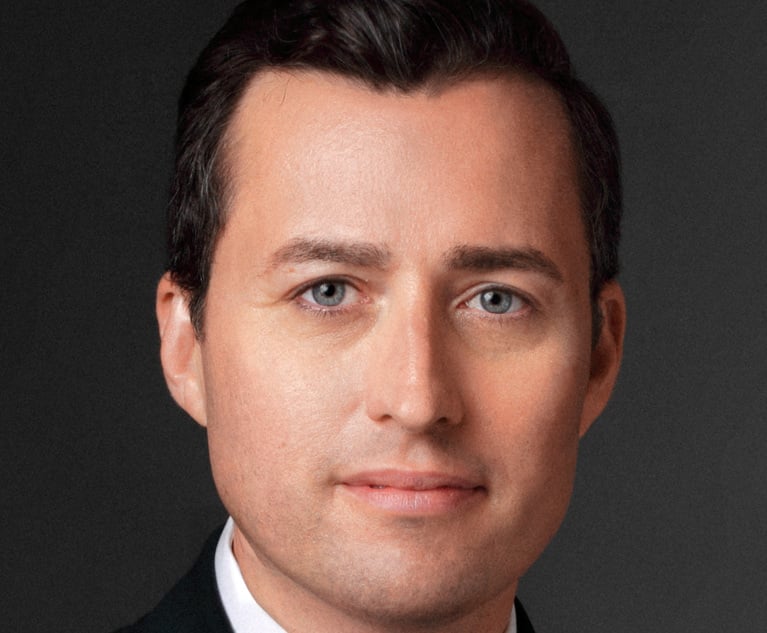New Questions Arise Following the Latest Ruling on MLMIC Distributions
The conversion of the Medical Liability Mutual Insurance Company (MLMIC) in New York from a mutual to a stock insurance company has given rise to an abundance of dispute resolution.
May 29, 2020 at 11:30 AM
9 minute read

The conversion of the Medical Liability Mutual Insurance Company (MLMIC) in New York from a mutual to a stock insurance company has given rise to an abundance of dispute resolution. As part of the demutualization process, MLMIC calculated and planned to issue payments to "eligible policyholders," reflecting the equity in MLMIC.
The process of returning MLMIC's equity was convoluted from the start but has become even more so as decision-makers struggle with one question: should payments be remitted to the named insured on the MLMIC policy (the medical provider) or to the insured's employers (the medical practice)?
The emerging majority view on this question has followed the holding in Schaffer, Schonholz & Drossman, LLP v. Title, 171 A.D.3d 465 (1st Dept. 2019) that the party paying the premiums on the MLMIC policy is entitled to payments. But, a recent decision from the Fourth Department in Maple-Gate Anesthesiologists, P.C. v. Deixy Nasrin and Douglas Brundin, 2020 NY Slip Op 02389 (4th Dept. 2020) has created a minority view that will likely need to be resolved ultimately by the New York Court of Appeals.
The MLMIC Demutualization
In mid-2018, MLMIC sought regulatory approval from the New York State Department of Financial Services (DFS) for its conversion. That request initiated a process of review, public comment, and then various decisions by DFS.
Part of what DFS had to decide was how the billions paid by Berkshire would get distributed and to whom. DFS did not decide the issue; rather, it left it to be determined through dispute resolution processes, including mediation, arbitration, and court proceedings.
The most definitive statement on this issue comes from the First Department. The court held that the radiology practice was entitled to the cash disbursement, reasoning,
Although [the provider] was named as the insured on the relevant MLMIC professional liability insurance policy, petitioner [the practice] purchased the policy and paid all the premiums on it. Respondent does not deny that she did not pay any of the annual premiums or any of the other costs related to the policy. Nor did she bargain for the benefit of the demutualization proceeds. Awarding respondent the cash proceeds of MLMIC's demutualization would result in her unjust enrichment.
Until recently, Schaffer remained the only appellate decision on this issue.
Supreme Court Decisions Following 'Schaffer'
While the Schaffer opinion was succinct, subsequent opinions from various Supreme Court proceedings have followed its logic and elaborated on its reasoning. In Maple Medical LLP v. Scott, 51103/2019, 2019 NYLJ LEXIS 2505 (2019) the court, applying Schaffer, held that because the practice procured, paid for, and was the policy administrator for the policies, it was entitled to the cash distribution. The court also pointed out that the physician was merely named on the policy and "did not bargain for the benefit of the payment" of the cash disbursement.
Two subsequent opinions are also favorable to practices getting the cash disbursement. In Schoch v. Lake Champlain OB-GYN, P.C., No. 2018-4228, 2019 N.Y. Misc. LEXIS 3911 (2019), the court held in favor of the practice, noting that it "controlled and maintained" the MLMIC policy through its administration, as well as having paid all of the premiums for the policy. The court ordered that judgment be entered in favor of the practice, awarding the cash disbursements as well as "interest accrued while the proceeds were in escrow, plus costs and disbursements."
In another opinion from within the Third Judicial Department, Urgent Med. Care, PLLC v. Amedure, No. 19-0121, 2019 N.Y. Misc. LEXIS 4039 (2019) the court noted:
Plaintiff has stated a claim for unjust enrichment. Plaintiff paid the premiums. Plaintiff claims that but for a mistake of fact, it would be the [named] policy administrator, and it was its payments and efforts that created the proceeds from demutualization. Defendant vigorously disagrees and properly notes she has legal title to the proceeds. Legal title does not end the inquiry … Plaintiff has clearly stated [] a claim."
In Sullivan v. Medical Liab. Mut. Ins. Co., 2019 N.Y. Misc. LEXIS 6418 (2019) the court granted summary judgment in favor of defendant Northwell Health, Inc. (Northwell) on its claim for declaratory judgment against the plaintiff physicians for the MLMIC cash disbursement.
Importantly, the Sullivan court noted that the relevant inquiry was "(1) who paid the premiums to MLMIC and (2) whether there was a bargained-for exchange with respect to the cash [disbursement] from the demutualization process." The court also rejected the plaintiffs' argument that they were entitled to the cash disbursement under Insurance Law §7307(e)(3). The plaintiffs argued that because they were MLMIC "policyholders" within the meaning of §7307, they were conclusively entitled to the cash disbursement.
The court held that such an interpretation would be contrary to the First Department's decision in Schaffer, which while it "did not explicitly address this issue, there, as here, the 'policyholder' (insured) was the employee-physician and nevertheless the First Department found that the employer, who had unquestionably paid the insurance premiums, was entitled to the cash [disbursement]." Justice Barry Ostrager also noted that "in January 2019, the Superintendent again clarified that regardless of the parties' status as 'policy administrators' or 'designees' and regardless even of whether the monies are paid out of escrow to one party or another, nothing in the Approved Plan determines the underlying legal rights of the parties to the cash [disbursement.]"
In Wyckoff Hgts. Med. Ctr. v. Monroe, 2020 N.Y. Misc. LEXIS 876, NY Slip Op 30529(U) (2020) the court cited the foregoing decisions in determining that the entity that paid the premiums was entitled to the cash compensation. In his effort to get around the earlier decisions, the physician argued that the premiums paid were part of a compensation package. These arguments were previously made in Columbia Memorial Hospital v. Hinds, 65 Misc.3d 1205(A), 2019 WL 46520674 (2019) where the court held that the evidence clearly demonstrated that the insurance premiums were part of the physician's compensation package and thus did not rule in favor of the hospital. The Wyckoff court noted that the employment agreement only referenced the premiums as "employment benefits," which had no bearing on the physician's compensation. As a result, the Wyckoff court held that premium payments could not be considered part of the defendant's "compensation." The Wyckoff court further noted that "even if the premiums can be considered compensation, there is no basis to conclude that the cash compensation naturally flows to [the physician] as compensation as well. There is no basis to argue her underpayment, if true, should include cash compensation that nobody could foresee when the employment agreement was negotiated."
'Maple-Gate Anesthesiologists'
Aside from Schaffer, the only other appellate court to issue a decision on this issue is the Fourth Department. Last week, the Fourth Department issued a decision in Maple-Gate Anesthesiologists, P.C. v. Deixy Nasrin and Douglas Brundin, 2020 NY Slip Op 02389 (4th Dept. 2020) where it reached a contrary conclusion to Schaffer.
Relying on New York Insurance Law §7307(e)(3), the Fourth Department noted that "[t]he plan stated that the cash distribution would be made to the policyholder unless he or she affirmatively designated a policy administrator…to receive such amount on [his or her] behalf." Because there was no documentary evidence that the physician (as the policyholder) had designated the practice to receive the distribution, the court ruled in favor of the physician.
In dicta, the Fourth Department also suggested that it would have rejected an equitable claim for unjust enrichment as well—expressly distinguishing itself from Schaffer.
Future Decisions
For 12 months, the First Department's decision in Schaffer appeared to conclusively settle the issue of entitlement to the cash distribution squarely in favor of whoever paid the premiums. The Fourth Department's apparent rejection of Schaffer has set up a split between the New York Appellate Departments that indicates the issue is far from resolved. The body of case law in all other departments follows and even expands positively on the Schaffer position that the party paying the premiums is entitled to the MLMIC cash disbursement. It seems that the Schaffer majority view will ultimately prevail. But, it remains to be seen whether the Second or Third Appellate Departments will weigh in with their own decisions, or await guidance from the Court of Appeals. Until the issue is resolved, physicians and medical practices will need to pay careful attention to this developing area of law.
Update: On May 6, 2020, the Suffolk County Supreme Court issued a decision awarding a MLMIC distribution to a medical practice after having the opportunity to review and consider the Maple-Gate analysis. Two physicians brought an Article 75 action challenging the award of the distribution by an arbitrator. In support of their challenge, the physicians urged the court to adopt the Fourth Department's reasoning and overturn the arbitrator's award. The court's analysis was limited to reviewing the arbitrator's award, rather than deciding the issue de novo. However, it offers an indication that the prevailing trend among New York Supreme Courts is to adopt the First Department's reasoning and decline to apply the Maple-Gate analysis.
Daniel J. Hurteau is a health care litigator, focusing his practice on complex business and tort-related actions for pharmaceutical companies, hospitals and health care providers, long-term care facilities and physicians. Erin Huntington is a trial and appellate lawyer who represents clients in various industries in all phases of litigation, mediation, and arbitration.
This content has been archived. It is available through our partners, LexisNexis® and Bloomberg Law.
To view this content, please continue to their sites.
Not a Lexis Subscriber?
Subscribe Now
Not a Bloomberg Law Subscriber?
Subscribe Now
NOT FOR REPRINT
© 2025 ALM Global, LLC, All Rights Reserved. Request academic re-use from www.copyright.com. All other uses, submit a request to [email protected]. For more information visit Asset & Logo Licensing.
You Might Like
View All
Uber Files RICO Suit Against Plaintiff-Side Firms Alleging Fraudulent Injury Claims
3 minute read
Insurance Company Sues Over 180 Health Care Providers for Fraud Under RICO
3 minute read
New York Court of Appeals Tightens Pleading Standards Against Insurance Policyholder
7 minute read
Amid Growing Litigation Volume, Don't Expect UnitedHealthcare to Change Its Stripes After CEO's Killing
6 minute readTrending Stories
- 1Uber Files RICO Suit Against Plaintiff-Side Firms Alleging Fraudulent Injury Claims
- 2The Law Firm Disrupted: Scrutinizing the Elephant More Than the Mouse
- 3Inherent Diminished Value Damages Unavailable to 3rd-Party Claimants, Court Says
- 4Pa. Defense Firm Sued by Client Over Ex-Eagles Player's $43.5M Med Mal Win
- 5Losses Mount at Morris Manning, but Departing Ex-Chair Stays Bullish About His Old Firm's Future
Who Got The Work
J. Brugh Lower of Gibbons has entered an appearance for industrial equipment supplier Devco Corporation in a pending trademark infringement lawsuit. The suit, accusing the defendant of selling knock-off Graco products, was filed Dec. 18 in New Jersey District Court by Rivkin Radler on behalf of Graco Inc. and Graco Minnesota. The case, assigned to U.S. District Judge Zahid N. Quraishi, is 3:24-cv-11294, Graco Inc. et al v. Devco Corporation.
Who Got The Work
Rebecca Maller-Stein and Kent A. Yalowitz of Arnold & Porter Kaye Scholer have entered their appearances for Hanaco Venture Capital and its executives, Lior Prosor and David Frankel, in a pending securities lawsuit. The action, filed on Dec. 24 in New York Southern District Court by Zell, Aron & Co. on behalf of Goldeneye Advisors, accuses the defendants of negligently and fraudulently managing the plaintiff's $1 million investment. The case, assigned to U.S. District Judge Vernon S. Broderick, is 1:24-cv-09918, Goldeneye Advisors, LLC v. Hanaco Venture Capital, Ltd. et al.
Who Got The Work
Attorneys from A&O Shearman has stepped in as defense counsel for Toronto-Dominion Bank and other defendants in a pending securities class action. The suit, filed Dec. 11 in New York Southern District Court by Bleichmar Fonti & Auld, accuses the defendants of concealing the bank's 'pervasive' deficiencies in regards to its compliance with the Bank Secrecy Act and the quality of its anti-money laundering controls. The case, assigned to U.S. District Judge Arun Subramanian, is 1:24-cv-09445, Gonzalez v. The Toronto-Dominion Bank et al.
Who Got The Work
Crown Castle International, a Pennsylvania company providing shared communications infrastructure, has turned to Luke D. Wolf of Gordon Rees Scully Mansukhani to fend off a pending breach-of-contract lawsuit. The court action, filed Nov. 25 in Michigan Eastern District Court by Hooper Hathaway PC on behalf of The Town Residences LLC, accuses Crown Castle of failing to transfer approximately $30,000 in utility payments from T-Mobile in breach of a roof-top lease and assignment agreement. The case, assigned to U.S. District Judge Susan K. Declercq, is 2:24-cv-13131, The Town Residences LLC v. T-Mobile US, Inc. et al.
Who Got The Work
Wilfred P. Coronato and Daniel M. Schwartz of McCarter & English have stepped in as defense counsel to Electrolux Home Products Inc. in a pending product liability lawsuit. The court action, filed Nov. 26 in New York Eastern District Court by Poulos Lopiccolo PC and Nagel Rice LLP on behalf of David Stern, alleges that the defendant's refrigerators’ drawers and shelving repeatedly break and fall apart within months after purchase. The case, assigned to U.S. District Judge Joan M. Azrack, is 2:24-cv-08204, Stern v. Electrolux Home Products, Inc.
Featured Firms
Law Offices of Gary Martin Hays & Associates, P.C.
(470) 294-1674
Law Offices of Mark E. Salomone
(857) 444-6468
Smith & Hassler
(713) 739-1250






